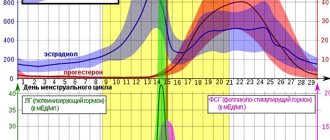Nutritionists prefer not to remember those times when people around them advised expectant mothers to eat not only for themselves, but also for “that guy or girl.”
Such behavior could not only spoil the figure of a woman in an interesting position and make her unattractive, but also pose a serious threat to her health during childbirth.
In order for the mother and the future newborn to feel great and receive the full range of nutrients, it is enough to provide them with a complete and balanced diet. Normally, if pregnancy proceeds without complications, a woman gains no more than 12 kg during the entire period.
But if the weight increases unevenly, swelling and some signs of gestosis appear, then fasting days during pregnancy become an urgent need.
The decision to prescribe a safe weight loss method for a pregnant woman is made only by a doctor! Even if the expectant mother dreams of arranging a fasting routine for preventive purposes on her own, she must agree on the menu for such a day with her doctor!
General rules
A pregnant woman's diet should be balanced and contain a full range of vitamins and minerals.
Since this cannot be achieved with nutrition alone, additional vitamin and mineral complexes are prescribed. The provision of vitamins and microelements is especially important in the early stages. During pregnancy, strict diets are prohibited, but fasting days are often recommended. By fasting we mean monotonous and low-calorie meals throughout the day. If you use a menu based on fruits and vegetables, then the optimal balance of vitamins is maintained. For other types of unloading, you can take vitamin-mineral complexes. Fasting days for pregnant women have a number of advantages: they are short-term (no more than one day), do not adversely affect the course of pregnancy and fetal development, are easily tolerated, are beneficial for certain conditions and can sometimes replace taking medications. Changing your usual diet can be called a “shake-up” for the body. During short-term restrictions, metabolism is stimulated and fat burning increases. When unloading, the load on the gastrointestinal tract is significantly reduced and kidney function is activated. The body gets rid of excess fluid and swelling .
During pregnancy, unloading is recommended when:
- rapid weight gain (norm 400 g per week);
- swelling;
- obesity;
- gestosis, the consequences of which can be: increased blood pressure, oxygen starvation of the fetus, premature birth or convulsions;
- increased blood pressure .
Calorie intake on fasting days is usually:
- In the first trimester - 600-800 kcal per day. It should be clarified that during this period, unloading is carried out rarely and only according to strict indications.
- In the second - 700-900 kcal.
- In the third - 800-1000 kcal.
However, many doctors do not recommend reducing calories to less than 1000 kcal at any time. Most often, fasting is prescribed after 28 weeks - during this period, short-term changes in nutrition will not affect the development of the child. In addition, in the third trimester, the load on the kidneys, heart, digestive tract increases and unloading in the diet will serve as a prevention of complications during this period.
To unload with maximum benefit and without harm to health, you must adhere to the following rules:
- Do it only on the recommendation of a doctor.
- The frequency should be once every 7-10 days. In some cases, the gynecologist may increase the breaks to 14 days.
- Duration: one daylight (from morning to night).
- Eating six times a day in equal portions at regular intervals.
- Alternating between different menus for unloading.
- Drink 1.5 liters of filtered water if there are no contraindications to this. Many people are prescribed a drinking regimen of 0.5 liters.
- A full night's sleep and two hours of rest during the day.
- Do not take in case of ARVI or exacerbation of chronic diseases.
- Limit physical and mental stress. On this day it is better to take walks in the air.
- Do not take diuretics or laxatives.
- Do not perform unloading during toxicosis .
All fasting days can be divided into relatively “hungry” fasting, which includes fermented milk, vegetable, fruit and “well-fed” in the form of meat, fish, soup, potato or buckwheat day.
Fermented milk products are a source of calcium, and during pregnancy a woman needs calcium “for two.” The need is greater if a woman is taking heparin or thyroid hormones. A fermented milk day is difficult, because during the day you are allowed to drink 1.5 liters of kefir, yogurt or low-fat fermented baked milk, yogurt. The fat content of fermented milk drinks should be no more than 1.5%. This relatively hungry discharge is permitted provided the woman is in good health.
Berry days are different in that you can eat up to 1 kg of fresh berries and 500 g of low-fat cottage cheese. They can be eaten separately or mixed. Berry compotes, fruit drinks, herbal and green teas are used as drinks.
On vegetable day, you are allowed to consume 1.5 kg of fresh seasonal vegetables - zucchini, bell pepper, grated pumpkin and carrots, cauliflower. Vegetables are eaten in the form of a salad, seasoned with vegetable oil, but without salt.
A fruit day is based on eating 1.5 kg of fresh fruit. The basis should be apples with the addition of pears, apricots, and plums. Freshly squeezed fruit juices are suitable as drinks. Bananas and grapes are not included in the unloading.
Eating cottage cheese, kefir, yogurt, berries or vegetables are options for pregnant women who need to lose weight. A watermelon day is recommended for kidney disease and a tendency to high blood pressure.
Fasting days on unsalted buckwheat porridge or rice (porridge made from 200 g of cereal) are also suitable if you have edema and high blood pressure. The large amount of complex carbohydrates in these cereals allows you not to feel hungry. You can add raw unsweetened fruits and vegetables (sweet peppers, carrots, herbs) to porridges.
Buckwheat is a source of magnesium, which is very important during pregnancy. Magnesium deficiency can cause calf muscle cramps, placental calcification, increased uterine tone and threat of miscarriage, arterial hypertension , premature birth, preeclampsia and eclampsia . Fresh vegetables, herbs (dill, parsley, green onions) and fruits also have a high concentration of magnesium.
On meat and fish days, you can eat 400-500 g of boiled lean, unsalted meat or fish. Additionally - raw vegetables (or steamed) in quantities up to 1 kg (bell peppers, cucumbers, tomatoes, cauliflower) and drink unsweetened tea and dried fruit compote.
On potato day, you can consume 1 kg of boiled unsalted potatoes and no more than 400 ml of low-fat kefir, as well as unsweetened tea.
Indications
Fasting days are indicated for the following conditions:
- rapid or uneven weight gain;
- edema of pregnant women;
- gestosis;
- isolated increase in blood pressure;
- obesity.
During fasting days, positive changes occur in the body:
- the load on internal organs (digestive tract, kidneys, heart) is reduced;
- metabolic processes are stabilized;
- toxins and metabolic products are eliminated;
- the activity of digestive enzymes is normalized;
- excess fluid is removed;
- swelling goes away;
- The overall tone of the body increases.
Fasting days are a serious shake-up for the body of a pregnant woman. It is not recommended to practice such dietary changes in the first trimester, when all fetal tissues are formed. Any negative changes during this period can disrupt the development of the embryo and even cause a miscarriage.
Fasting days should be carried out after 28 weeks of pregnancy. At this time, all organs and systems of the fetus are formed, and short-term changes in the mother’s diet will not affect its development in any way. At the same time, in the third trimester the load on the digestive tract, kidneys and heart increases. Fasting days will be an excellent way to prevent various complications during this difficult period.
Exit from fasting day
After completing the unloading, it is important to gradually return to your usual diet:
- drink a glass of water in the morning before breakfast;
- frequent and small meals (5-6 times a day);
- light but satisfying breakfast (the best choice is various cereals with berries, dried fruits or apples);
- easily digestible dishes for lunch and dinner: chicken broth soup, vegetable stew, boiled fish, salads, omelet;
- exclude fried and spicy foods for at least two days after fasting;
- do not plan physical activity the next day after unloading.
Fasting days are also used after the birth of a child, but you need to remember that “hungry” fasting (fruit, fermented milk, vegetable, buckwheat days) are not suitable for nursing women. The best option would be meat, fish or soup days.
Who is allowed and who is contraindicated to unload
There is a category of women for whom fasting days are contraindicated. These include pregnant women who have the following health problems:
- diseases requiring a specific diet, such as diabetes;
- chronic diseases of the digestive system;
- pathology of internal organs and related diseases;
- poor general health, depression.
In all other cases, women can safely unload. Sometimes for the first time you have to overcome yourself and develop willpower.
But, having felt relief, every pregnant woman will want to repeat the procedure again.
Authorized Products
- Lean varieties of meat and poultry, rabbit, turkey, cooked by boiling and without salt.
- Low-fat types of fish (usually sea).
- Fermented milk products 1-1.5% fat.
- Cottage cheese 0.5-0.6% fat content.
- Vegetables: green peas (not canned), zucchini, cucumber, all types of cabbage, green beans, onions and garlic (for soup), bell peppers, lettuce, tomatoes, raw carrots, greens. It is advisable to consume all vegetables raw. Stewing or boiling is used in the presence of chronic diseases of the gastrointestinal tract.
- Unrefined vegetable oils for salad dressings - flaxseed, corn, olive, sesame, sunflower.
- Rosehip infusion, unsweetened herbal tea, weak green tea, freshly prepared juices, still water throughout the day.
Table of permitted products
| Proteins, g | Fats, g | Carbohydrates, g | Calories, kcal | |
Vegetables and greens | ||||
| greenery | 2,6 | 0,4 | 5,2 | 36 |
| zucchini | 0,6 | 0,3 | 4,6 | 24 |
| broccoli | 3,0 | 0,4 | 5,2 | 28 |
| Brussels sprouts | 4,8 | 0,0 | 8,0 | 43 |
| cabbage | 1,2 | 0,2 | 2,0 | 16 |
| watercress | 2,3 | 0,1 | 1,3 | 11 |
| red onion | 1,4 | 0,0 | 9,1 | 42 |
| bulb onions | 1,4 | 0,0 | 10,4 | 41 |
| cucumbers | 0,8 | 0,1 | 2,8 | 15 |
| olives | 0,8 | 10,7 | 6,3 | 115 |
| salad pepper | 1,3 | 0,0 | 5,3 | 27 |
| arugula | 2,6 | 0,7 | 2,1 | 25 |
| tomatoes | 0,6 | 0,2 | 4,2 | 20 |
| dill | 2,5 | 0,5 | 6,3 | 38 |
| garlic | 6,5 | 0,5 | 29,9 | 143 |
Fruits | ||||
| apples | 0,4 | 0,4 | 9,8 | 47 |
| baked sweet and sour apples | 0,5 | 0,5 | 12,3 | 59 |
Dairy | ||||
| kefir 1% | 2,8 | 1,0 | 4,0 | 40 |
Cheeses and cottage cheese | ||||
| cottage cheese 0% (low fat) | 16,5 | 0,0 | 1,3 | 71 |
Meat products | ||||
| lean beef | 22,2 | 7,1 | 0,0 | 158 |
| veal | 19,7 | 1,2 | 0,0 | 90 |
| rabbit | 21,0 | 8,0 | 0,0 | 156 |
Bird | ||||
| steamed chicken breast | 23,6 | 1,9 | 0,0 | 113 |
| boiled chicken fillet | 30,4 | 3,5 | 0,0 | 153 |
| turkey | 19,2 | 0,7 | 0,0 | 84 |
Fish and seafood | ||||
| boiled fish | 17,3 | 5,0 | 0,0 | 116 |
| seaweed | 0,8 | 5,1 | 0,0 | 49 |
| zander | 19,2 | 0,7 | — | 84 |
| cod | 17,7 | 0,7 | — | 78 |
| hake | 16,6 | 2,2 | 0,0 | 86 |
| pike | 18,4 | 0,8 | — | 82 |
Oils and fats | ||||
| vegetable oil | 0,0 | 99,0 | 0,0 | 899 |
| linseed oil | 0,0 | 99,8 | 0,0 | 898 |
Non-alcoholic drinks | ||||
| mineral water | 0,0 | 0,0 | 0,0 | — |
| instant chicory | 0,1 | 0,0 | 2,8 | 11 |
| green tea | 0,0 | 0,0 | 0,0 | — |
Juices and compotes | ||||
| rose hip juice | 0,1 | 0,0 | 17,6 | 70 |
| * data is per 100 g of product | ||||
Diet and nutrition in the 1st trimester
During the first trimester of pregnancy, the embryo develops into a fetus. Already at 3 weeks you can hear the beating of a tiny heart, and at 4 weeks the eyes appear, the spine, nervous and circulatory system, as well as the intestines are formed. At the same time, the brain is born and the embryo gradually “transforms” into a fetus. These are the most serious weeks in the development of the unborn baby, so it is especially important that the fetus receives everything it needs for full development. In the first trimester, a pregnant woman should choose foods especially carefully.
Good to know! To reduce the risk of congenital pathologies in the fetus, the mother’s diet should contain proteins, folic acid, zinc, selenium, and copper. Iodine, cobalt and vitamins C and B will reduce the manifestations of toxicosis in a woman, and will also help the proper formation of the thyroid gland in the fetus.
Proteins not only reduce the risk of fetal pathologies, but are also a building material for embryonic cells. Folic acid (vitamin B9) promotes timely cell division and is responsible for the baby’s nervous system. A deficiency of these elements in the body of a pregnant woman in the first trimester can lead to irreversible consequences for the baby after birth. To prevent this, a pregnant woman’s diet during the 1st trimester should include daily foods rich in these elements:
- lean meat and eggs,
- legumes,
- cabbage, lettuce, peas,
- wholemeal bread (high in fiber and vitamin B)
- cheese, cottage cheese (these products should be low in fat),
- seaweed,
- freshly squeezed juices, especially apple and celery juices;
- liver.
The health of the unborn child depends on what you eat in the first three months of pregnancy, so give up anything that can negatively affect the development of the fetus and will not bring you any tangible benefit:
- instant products and fast foods,
- crackers and chips,
- carbonated drinks,
- canned food,
- coffee (exclude completely, as there may be bad consequences from increased blood pressure to miscarriage),
- vinegar, pepper, mustard.
Give preference to vegetables and fruits - they are much healthier for both you and your unborn baby.
Fully or partially limited products
- Fatty meats and poultry.
- Fatty fish, canned fish.
- Animal fats for making soups.
- Fat cottage cheese and kefir.
- Starchy vegetables - boiled beets and carrots, corn, eggplant, pumpkin.
- Simple carbohydrates - sugar, honey, waffles, polished rice, sweet fruits, condensed milk, sweet drinks, confectionery, candies, semolina, jam, ice cream, preserves, chocolate, dried fruits.
- Salt is excluded (as recommended by a doctor) or limited.
- Carbonated drinks, sweet tea.
Table of prohibited products
| Proteins, g | Fats, g | Carbohydrates, g | Calories, kcal | |
Vegetables and greens | ||||
| vegetables legumes | 9,1 | 1,6 | 27,0 | 168 |
| potato | 2,0 | 0,4 | 18,1 | 80 |
| carrot | 1,3 | 0,1 | 6,9 | 32 |
| beet | 1,5 | 0,1 | 8,8 | 40 |
| horseradish | 3,2 | 0,4 | 10,5 | 56 |
Fruits | ||||
| bananas | 1,5 | 0,2 | 21,8 | 95 |
| melon | 0,6 | 0,3 | 7,4 | 33 |
| figs | 0,7 | 0,2 | 13,7 | 49 |
| mango | 0,5 | 0,3 | 11,5 | 67 |
Berries | ||||
| grape | 0,6 | 0,2 | 16,8 | 65 |
Nuts and dried fruits | ||||
| raisin | 2,9 | 0,6 | 66,0 | 264 |
| dates | 2,5 | 0,5 | 69,2 | 274 |
Snacks | ||||
| potato chips | 5,5 | 30,0 | 53,0 | 520 |
Cereals and porridges | ||||
| porridge | 3,3 | 1,2 | 22,1 | 102 |
| white rice | 6,7 | 0,7 | 78,9 | 344 |
Flour and pasta | ||||
| pasta | 10,4 | 1,1 | 69,7 | 337 |
| pancakes | 6,1 | 12,3 | 26,0 | 233 |
| vareniki | 7,6 | 2,3 | 18,7 | 155 |
| pancakes | 6,3 | 7,3 | 51,4 | 294 |
| dumplings | 11,9 | 12,4 | 29,0 | 275 |
Bakery products | ||||
| buns | 7,2 | 6,2 | 51,0 | 317 |
| wheat bread | 8,1 | 1,0 | 48,8 | 242 |
Confectionery | ||||
| jam | 0,3 | 0,2 | 63,0 | 263 |
| jam | 0,3 | 0,1 | 56,0 | 238 |
| candies | 4,3 | 19,8 | 67,5 | 453 |
| cookie | 7,5 | 11,8 | 74,9 | 417 |
| cake | 3,8 | 22,6 | 47,0 | 397 |
| jam | 0,4 | 0,2 | 58,6 | 233 |
| dough | 7,9 | 1,4 | 50,6 | 234 |
| halva | 11,6 | 29,7 | 54,0 | 523 |
Cakes | ||||
| cake | 4,4 | 23,4 | 45,2 | 407 |
Chocolate | ||||
| chocolate | 5,4 | 35,3 | 56,5 | 544 |
Raw materials and seasonings | ||||
| seasonings | 7,0 | 1,9 | 26,0 | 149 |
| mustard | 5,7 | 6,4 | 22,0 | 162 |
| ginger | 1,8 | 0,8 | 15,8 | 80 |
| mayonnaise | 2,4 | 67,0 | 3,9 | 627 |
| honey | 0,8 | 0,0 | 81,5 | 329 |
| sugar | 0,0 | 0,0 | 99,7 | 398 |
| vinegar | 0,0 | 0,0 | 5,0 | 20 |
Dairy | ||||
| milk | 3,2 | 3,6 | 4,8 | 64 |
| milk 3.2% | 2,9 | 3,2 | 4,7 | 59 |
| condensed milk | 7,2 | 8,5 | 56,0 | 320 |
Cheeses and cottage cheese | ||||
| cheese | 24,1 | 29,5 | 0,3 | 363 |
| cottage cheese 18% (fat) | 14,0 | 18,0 | 2,8 | 232 |
Meat products | ||||
| fatty pork | 11,4 | 49,3 | 0,0 | 489 |
| pork fat | 1,4 | 92,8 | 0,0 | 841 |
| salo | 2,4 | 89,0 | 0,0 | 797 |
| bacon | 23,0 | 45,0 | 0,0 | 500 |
Sausages | ||||
| boiled sausage | 13,7 | 22,8 | 0,0 | 260 |
| smoked sausage | 28,2 | 27,5 | 0,0 | 360 |
| smoked sausage | 9,9 | 63,2 | 0,3 | 608 |
| sausages | 10,1 | 31,6 | 1,9 | 332 |
| sausages | 12,3 | 25,3 | 0,0 | 277 |
Bird | ||||
| smoked chicken | 27,5 | 8,2 | 0,0 | 184 |
| duck | 16,5 | 61,2 | 0,0 | 346 |
| goose | 16,1 | 33,3 | 0,0 | 364 |
Eggs | ||||
| eggs | 12,7 | 10,9 | 0,7 | 157 |
Fish and seafood | ||||
| fried fish | 19,5 | 11,7 | 6,2 | 206 |
| salted fish | 19,2 | 2,0 | 0,0 | 190 |
| pink salmon | 20,5 | 6,5 | 0,0 | 142 |
| caviar | 36,0 | 10,2 | 0,0 | 123 |
| Red caviar | 32,0 | 15,0 | 0,0 | 263 |
| cod roe | 24,0 | 0,2 | 0,0 | 115 |
| canned fish | 17,5 | 2,0 | 0,0 | 88 |
| semi-finished fish products | 12,5 | 6,7 | 14,7 | 209 |
Oils and fats | ||||
| butter | 0,5 | 82,5 | 0,8 | 748 |
| creamy margarine | 0,5 | 82,0 | 0,0 | 745 |
| coconut oil | 0,0 | 99,9 | 0,0 | 899 |
| vegetable-fat spread | 0,0 | 40,0 | 0,0 | 360 |
| animal fat | 0,0 | 99,7 | 0,0 | 897 |
| cod liver oil | 0,0 | 99,8 | 0,0 | 898 |
| cooking fat | 0,0 | 99,7 | 0,0 | 897 |
Alcoholic drinks | ||||
| white dessert wine 16% | 0,5 | 0,0 | 16,0 | 153 |
| vodka | 0,0 | 0,0 | 0,1 | 235 |
| cognac | 0,0 | 0,0 | 0,1 | 239 |
| liquor | 0,3 | 1,1 | 17,2 | 242 |
| beer | 0,3 | 0,0 | 4,6 | 42 |
Non-alcoholic drinks | ||||
| cola | 0,0 | 0,0 | 10,4 | 42 |
| coffee | 0,2 | 0,0 | 0,3 | 2 |
| Pepsi | 0,0 | 0,0 | 8,7 | 38 |
| sprite | 0,1 | 0,0 | 7,0 | 29 |
| energy drink | 0,0 | 0,0 | 11,3 | 45 |
| * data is per 100 g of product | ||||
Fasting day menu during pregnancy (Diet)
The menu is determined by the option of the selected fasting day. Below are several menu options, which can be alternated in consultation with your doctor.
Rice day - cook rice in water without salt, using 200 g of cereal. Divide into 5 equal portions. Vegetables and fruits are used as a supplement or snack.
| Breakfast |
|
| Lunch |
|
| Dinner |
|
| Afternoon snack |
|
| Dinner |
|
Unloading on buckwheat porridge - cook the porridge in water from 300 g of cereal and divide into 5 servings. Supplement with fresh fruits and vegetables.
| Breakfast |
|
| Lunch |
|
| Dinner |
|
| Afternoon snack |
|
| Dinner |
|
Unloading on cottage cheese. Divide half a kilogram of low-fat cottage cheese into 5 servings. Additional products include kefir or yogurt.
| Breakfast |
|
| Lunch |
|
| Dinner |
|
| Afternoon snack |
|
| Dinner |
|
Meat and fish day - 400-500 g of boiled unsalted meat (beef, chicken, turkey) or fish, divided into 5 doses. Fresh or boiled vegetables as a side dish in the amount of 800-1000 g.
| Breakfast |
|
| Lunch |
|
| Dinner |
|
| Afternoon snack |
|
| Dinner |
|
How to make it easier
There are special recommendations for pregnant women to make the fasting day not only useful, but also enjoyable. In order to easily endure dietary restrictions, it is recommended to chew each dish thoroughly - thanks to this, satiety occurs much faster.
During the fasting day, it is best to engage in interesting, exciting activities that will help take your mind off thoughts about food. It is very important to reduce physical activity, refuse to do exercises or go to the pool. When unloading, a walk in the park is quite enough.
If a pregnant woman feels a strong attack of hunger, you should not endure it - you are allowed to refresh yourself with a glass of low-fat kefir, yogurt or other fermented milk product.
Recipes
Relatively satisfying is unloading on vegetable soup. It is suitable for women who have a hard time feeling hungry, as well as pregnant women suffering from diseases of the digestive tract. The amount of soup that can be consumed per day is 1-1.5 liters.
Necessary products: cauliflower, broccoli, carrots, young peas, leeks or onions, garlic, herbs. Ingredients may vary based on taste preferences.
Finely chop the vegetables, put them in boiling water, add a little salt. Vegetables should not be fried. Divide the soup into 5 portions. On this day, the amount of other liquid should be reduced.
Apple fasting day recipe for pregnant women
The basis of this day is 1.5 kg of apples. It's hard to come up with any recipes that only have one ingredient. You can prepare grated apples with the addition of olive oil, and for variety, you can stew or bake one serving of apples. When heat treated, they become tender, so they are preferable for women with gastrointestinal diseases ( gastritis , pancreatitis , colitis ). During the day you can drink water, rosehip infusion or green tea without sugar.
Baked apples
Wash the apples and thoroughly remove seeds. Adding sugar is not allowed. Place the fruits on a baking sheet and bake for 10-20 minutes (depending on the variety) at a temperature of 1800.
Apples stewed with cinnamon
Wash the fruits, remove seeds and, if desired, remove peels. Place on a baking sheet, sprinkle with cinnamon and add a little water. Cover with foil and simmer in the oven for 15-20 minutes until done.
Why are they useful?
The benefit of fasting days for pregnant women is that this short-term diet is prescribed for medicinal purposes. Most often this is:
- excess weight;
- excessively high rate of weight gain;
- excessive swelling;
- attacks of hypertension;
- gestosis.
During a fasting day, a woman’s body gets the opportunity to free itself from unnecessary “garbage” in the form of toxins and waste that have accumulated even over the years.
In addition, it has a beneficial effect on the body’s metabolic processes and allows you to get rid of existing digestive problems; the organs of this system can “rest.”
Many pregnant women note that after a fasting day, a long-forgotten feeling of lightness appears. Even your mood often improves and strength appears.
Advantages and disadvantages
| pros | Minuses |
|
|
Contraindications
Contraindications for each diet for a fasting day are individual. Thus, a diet based on tomatoes is contraindicated for those suffering from cholelithiasis, so as not to cause an exacerbation. General contraindications are recommended in order not to aggravate the situation of the body.
But a fasting day is undesirable:
- Patients with diabetes mellitus.
- After a serious illness that weakened the immune system.
- During a stressful situation and during intense physical activity.
- For gastrointestinal diseases that require regular food intake.
- For women - during menstruation, since the body is already under stress at this time.
Reviews and results
According to most reviews, losing weight based on a diet containing proteins and vegetables gives good results. As evidenced, with this method of losing weight, the feeling of hunger is practically absent. In addition, the presence of fiber in the diet allows you to normalize the functioning of the gastrointestinal tract and helps remove waste and toxins from the intestines.
- “... From 17-18 weeks, weight gain began (in recent months it was very large), because of this, the gynecologist prescribed a fasting day once a week. He says that the swelling appeared due to weight. Weight is growing and appetite is increasing every week. How difficult it is to sit on apples all day! I really want meat and bread. In general, my head is spinning if I want to eat. But during such a fruity day I lost 2 kg. The second time, the doctor recommended kefir with baked potatoes - that’s okay. I drank cranberry juice, but added a little sugar. The swelling went away well and the weight gradually decreased, or at least did not gain more than normal. Then I tried spending the day on baked apples - after them I didn’t feel as hungry and the liquid went away better.”
- “... Unloading did me good. In recent months I have been eating fruit (once a week), excluding grapes and bananas. There was a result, although not the first time. It wasn’t easy to bear at first, but then I gradually got used to it. The first time I sat all day on pamelo, apples and orange, and in the evening I had a hearty dinner. On the day of unloading, I drank only 0.5 liters of liquid. I ate up to 1.5 kg of different fruits: kiwi, apple, grapefruit, pears, oranges, pomegranate and that was enough for me. First of all, the swelling went away and the weight dropped a little. The positive thing was that after unloading, I began to eat less sweets and starchy foods—I didn’t even want to. We also managed to keep the pressure normal, although I limited the salt a little. This helped me get through my pregnancy normally without any “accidents.”
- “...I can say from myself that it is not necessary to torment with kefir or apples alone. I agree that sitting on apples is very difficult. Many people talk about kefir with apples. But it seems to me that you can have fruits and vegetables, boiled and unsalted fish and low-fat cottage cheese. This diet plan also helps me - minus 800 g. Even if I don’t eat salty and starchy foods, I can lose the same amount in a day. On the other days of the week, it helps a lot not to eat at night. After 18:00, if I am hungry, I eat only fruits. I try to eat less flour and salty foods. The weight is gradually decreasing."
When indicated and contraindicated
The main indication for fasting days is active weight gain that goes beyond the norm. Unloading is also indicated for the following problems:
- severe swelling;
- gestosis;
- dyspnea;
- hypertension.
You should practice fasting days only with the consent of your doctor or on his recommendation. Otherwise, there is a risk of side effects:
- fainting;
- exacerbation of gastritis;
- violation of metabolic processes;
- pathologies of fetal development.
Strict contraindications:
- low body weight before pregnancy;
- low rate of weight gain of the expectant mother;
- presence of gastrointestinal diseases;
- severe diseases of the urinary system;
- hypotension;
- heart failure;
- diabetes.
Fasting days are used with caution during multiple pregnancies. If doctors diagnose fetal development delay or the threat of miscarriage, they are strictly prohibited!
There are contraindications to consuming certain foods on fasting days. For example, eating meat is prohibited in case of chronic gastrointestinal diseases and diseases of the cardiovascular system.











